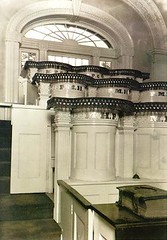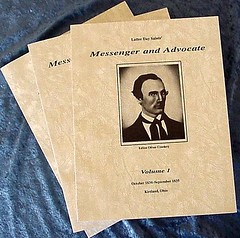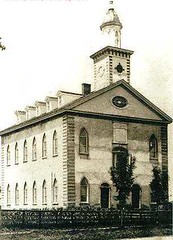Pope Says Materialism Pollutes Christmas Spirit
 Quite frankly . . . I agree with him. From today's Reuters news wire:
Quite frankly . . . I agree with him. From today's Reuters news wire:Dec 11, 8:21 AM (ET)
VATICAN CITY (Reuters) - Pope Benedict warned on Sunday against rampant materialism which he said was polluting the spirit of Christmas.
"In today's consumer society, this time of the year unfortunately suffers from a sort of commercial 'pollution' that threatens to alter its real spirit," the Pope told a large crowd gathered in St. Peter's Square to hear his weekly Angelus blessing.
He said Christmas should be marked with sober celebrations and urged Christians to display a nativity crib in their houses as "a simple but effective way of showing their faith and conveying it to their children."
Last year, under Pope John Paul, the Vatican launched a high-profile campaign to urge Roman Catholic Italy not to compromise the spirit of Christmas through excess or dilute its message out of fear of offending a growing Muslim population."
Every year it seems the Spirit of Christmas is polluted a bit more by the commercial message, in which we find ourselves drowning. For the first time that I can ever recall, some stores were open Thanksgiving day for a few hours, and others started after midnight after Thanksgiving Day. In stark contrast, we find the humble beginnings of the Savior's life--the first Christmas--in Luke 2: 1-19
7 And she brought forth her firstborn son, and wrapped him in swaddling clothes, and laid him in a manger; because there was no room for them in the inn.The entire message of His birth, one of humble circumstance foreshadowed the Savior's entire life. James Talmage in Jesus The Christ noted the humble circumstance of Christ's birth:
2. Jesus Born Amidst Poor Surroundings.—Undoubtedly the accommodations for physical comfort amidst which Jesus was born were few and poor. But the environment, considered in the light of the customs of the country and time, was far from the state of abject deprivation which modern and western ways would make it appear. "Camping out" was no unusual exigency among travelers in Palestine at the time of our Lord's birth; nor is it considered such today. It is, however, beyond question that Jesus was born into a comparatively poor family, amidst humble surroundings associated with the inconveniences incident to travel.
Cunningham Geikie, Life and Words of Christ, chap. 9, pp. 112, 113, says: "It was to Bethlehem that Joseph and Mary were coming, the town of Ruth and Boaz, and the early home of their own great forefather David. As they approached it from Jerusalem they would pass, at the last mile, a spot sacred to Jewish memory, where the light of Jacob's life went out, when his first love, Rachel, died, and was buried, as her tomb still shows, 'in the way to Ephrath, which is Bethlehem.' . . . Traveling in the East has always been very different from Western ideas. As in all thinly-settled countries, private hospitality, in early times, supplied the want of inns, but it was the peculiarity of the East that this friendly custom continued through a long series of ages.
On the great roads through barren or uninhabited parts, the need of shelter led, very early, to the erection of rude and simple buildings, of varying size, known as khans, which offered the wayfarer the protection of walls and a roof, and water, but little more. The smaller structures consisted of sometimes only a single empty room, on the floor of which the traveler might spread his carpet for sleep; the larger ones, always built in a hollow square, enclosing a court for the beasts, with water in it for them and their masters. From immemorial antiquity it has been a favorite mode of benevolence to raise such places of shelter, as we see so far back as the times of David, when Chimham built a great khan near Bethlehem, on the caravan road to Egypt."
Canon Farrar (Life of Christ, chap. 1) accepts the traditional belief that the shelter within which Jesus was born was that of one of the numerous limestone caves which abound in the region, and which are still used by travelers as resting places. He says: "In Palestine it not infrequently happens that the entire khan, or at any rate the portion of it in which the animals are housed, is one of those innumerable caves which abound in the limestone rocks of its central hills. Such seems to have been in the case at the little town of Bethlehem-Ephratah, in the land of Judah. Justin Martyr, the Apologist, who, from his birth at Shechem, was familiar with Palestine, and who lived less than a century after the time of our Lord, places the scene of the nativity in a cave. This is, indeed, the ancient and constant tradition both of the Eastern and the Western Churches, and it is one of the few to which, though unrecorded in the Gospel history, we may attach a reasonable probability."
See Jesus The Christ Chapter 8, Footnote 2.
Somehow today's Christmas season seems far removed from the birth of Him we celebrate, some 2000 years ago in a limestone cave, and wrapped in swaddling clothes.







2 Comments:
Every year it seems the Spirit of Christmas is polluted a bit more by the commercial message, in which we find ourselves drowning.
True enough. But when commercial establishments try to distance their polluted messages from Christmas, certain Christians take offense.
I say, let the business community have "the holidays," and give us our religious Christmas back.
L Lemming,
Thanks for stopping by and commenting. You have a good point about certain Christians taking offense re: the holiday v Christmas thing. I almost don't recognize the season any more. Yet, there is still something about the feeling of Christmas that can't, or hasn't yet been lost.
It would be refreshing to return to a religious Christmas we weren't afraid of celebrating for fear of offending someone.
Post a Comment
<< Home